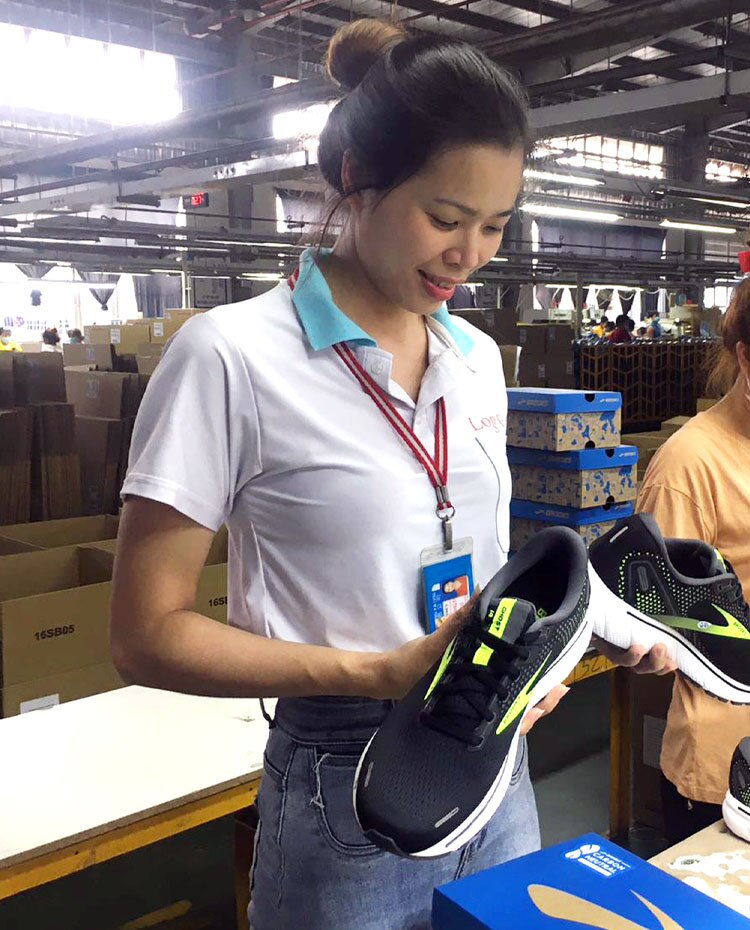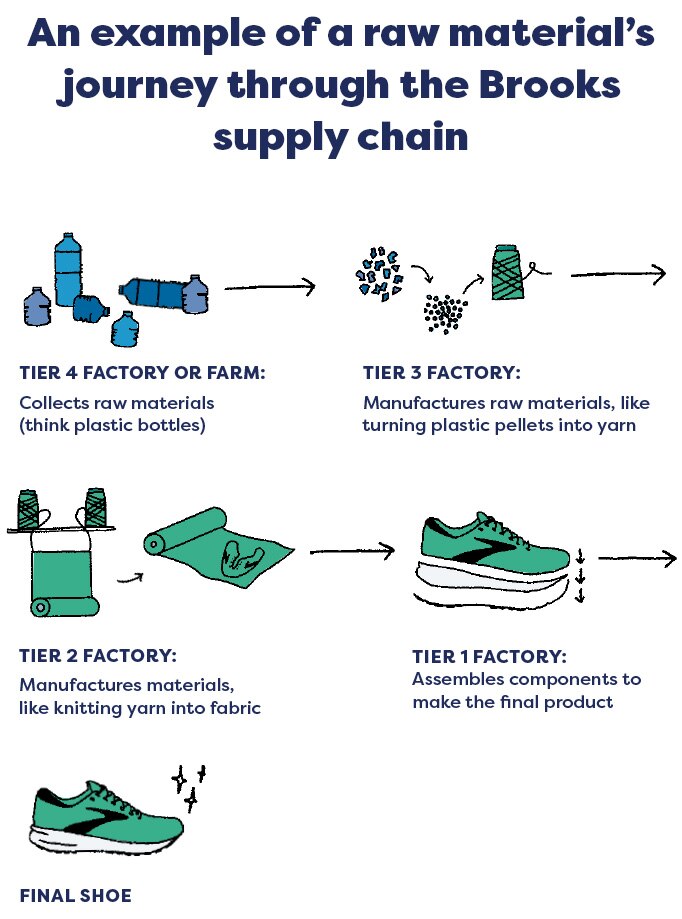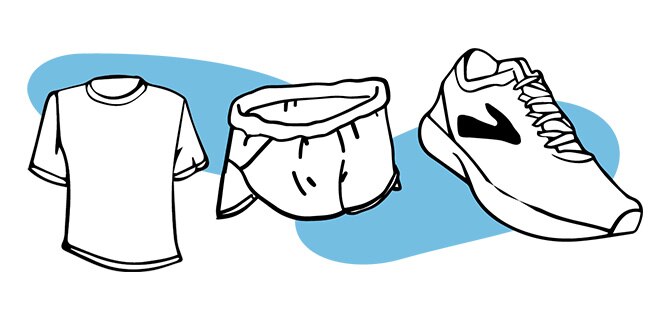Our approach
At Brooks, we know that a responsible global supply chain starts with the decisions we make. That is why we establish long-term partnerships with factories that share our objectives to trace our supply chain, respect human rights, and ensure environmental compliance.


Trace our supply chain
Partner with factories to continuously trace our product from Tier 1 through Tier 4
Our target:
- Continuously trace our manufacturing supply chain for high-volume and high-risk product
Visibility into the factories that manufacture Brooks products, materials, and raw materials, none of which we own or operate, is critical to ensure that the responsible sourcing standards outlined in our Supplier Code of Conduct are upheld. The expansive and complex nature of footwear and apparel supply chains makes this visibility difficult. Therefore, in 2022 we invested in a software solution called TrusTrace to help us continuously discover and trace factories throughout the Brooks manufacturing supply chain.

We strategically prioritize tracing our highest volume styles, which are at least 65% of Brooks’ total units manufactured in a calendar year. We also trace styles with materials that are considered high-risk in the industry. These materials may come from regions that present a high risk to human rights violations. For each of these styles, we trace key materials and components from raw materials to the final product assembly. This deeper visibility into our supply chain will be used to identify and mitigate responsible sourcing risks, increase due diligence for customs compliance and identify business continuity risks.
Suppliers are an integral part of our traceability strategy because their collaboration helps us identify and verify upstream supply chain data at every manufacturing stage. Our traceability program is rooted in transparency, trust, and partnership, and through these values we will continue to bring responsible sourcing practices to the suppliers we know and those we have yet to discover.
We believe it is important to be transparent about where our products are made. Learn more about factories in the Brooks manufacturing supply chain on our Supply Chain Transparency page.
Respect human rights
Work with factories that share our values in respecting human rights, promote fair and safe working conditions, and advance employee well-being.
Our target:
- 100% of in-scope factories1 complete and verify an annual SLCP CAF assessment
Policies and standards
We ground ourselves in the Universal Declaration of Human Rights and the International Labour Organization Declaration on Fundamental Principles and Rights of Work. We also align our policies and standards with international best practices, including the Ethical Trade Initiative base code, and Business Social Compliance Initiative (BSCI).
The Brooks Supplier Code of Conduct (Code) is the foundation of our responsible sourcing program. Together with local law and international labour standards, it sets the standards for all factories in our manufacturing supply chain.

- Transparent partnerships and collaboration
- Compliance to local and national laws and regulations
- A safe and healthy working environment
- Fair compensation
- Sustainable manufacturing
Key topics addressed by the Code include:
- Health and safety
- Child labour
- Forced labour
- Working hours
- Wages and benefits
- Harassment, abuse, and discipline
- Non-discrimination
- Freedom of association and collective bargaining
- Environmental responsibility
- Chemical management
The Code is part of the purchase agreement and must be signed by all suppliers who manufacture Brooks product and materials, to ensure a common vision, accountability, and transparency.
Compliance to our Code
As part of our new supplier onboarding process, Brooks requires all factories to sign the Brooks Supplier Code of Conduct, which certifies:
- They meet or exceed the requirements in the Code
- They will maintain current and detailed records to substantiate compliance with the Code
- They will be transparent with Brooks in all respects, providing documents with accurate working hours and payroll records when requested
- Any Brooks merchandise will be produced in compliance with the wage and working hours laws of the country of manufacture and without the use of child, prison, or forced labour
- They understand that failure to comply with the Code may result in termination of business with Brooks
Additionally, Brooks requires all prospective factories to complete a Social Labour Convergence Program (SLCP) Converged Assessment Framework (CAF) assessment and verification to evaluate social and labour practices and verify compliance to our Code.
In 2021, as a Cascale member and a signatory of the SLCP, we aligned with the apparel and footwear industry by fully adopting the SLCP CAF and replacing our traditional third-party audit approach. This industry-standardized tool measures social labour practices in factories across nine key areas:
- Recruitment and hiring
- Working hours
- Wages and benefits
- Worker treatment
- Worker involvement
- Health and safety
- Termination
- Management systems
- Empowering people and communities
The SLCP CAF can be shared with brand partners via two accredited hosts: Worldly (via the Higg Index) and Fair Factories Clearinghouse "(FFC)". The SLCP has also collaborated with Better Work, an International Labour Organization program that assesses compliance with international labour laws to improve working conditions. This collaboration means that Better Work will use the SLCP CAF assessment during their assessments to reduce audit fatigue and promote data sharing in the industry. As a Cascale member, we encourage our factories to use Worldly to complete the SLCP assessment through the Higg Facility Social Labour Module (Higg FSLM); however, we also accept the SLCP report through FFC and Better Work. This ensures we are doing our part to help reduce duplicative auditing and costs for our suppliers.
The SLCP CAF evaluation begins with a self-assessment completed by the factory that is subsequently verified by an SLCP-approved verifier to confirm that assessment questions were understood and answered correctly and the data is reliable. During verification, approved verifiers review the factory’s responses and conduct semi-announced onsite verification, which includes an opening and closing meeting, document review, factory employee interviews, and a facility walk-through. With industry adoption of this tool, duplicative auditing is eliminated, and brands can collaborate with their shared factories to use one data set to drive social and labour improvements in their supply chains.
Once factories are successfully onboarded, we annually evaluate 100% of our Tier 1 final assembly factories to ensure their continued compliance to our Code and local law through the use of a verified SLCP CAF assessment. We use a risk-based approach to determine our engagement level with Tier 2 material suppliers, prioritizing our annual engagement with factories that account for approximately 80% of our materials volume by dollar spend.
We recognize that forced labour concerns of foreign migrant workers are among the most serious challenges facing the apparel and footwear industry. As a founding signatory of the Commitment to Responsible Recruitment, we commit to work with our global supply chain partners to ensure that no worker pays for their job, workers receive a timely refund of fees and costs paid to obtain or maintain their job, workers retain control of their travel documents and all workers are informed of the basic terms of their employment before leaving home.
Beyond annual assessments
While we believe our use of annual verified SLCP CAF assessments are critical to the success of our Responsible Sourcing efforts, we recognize that these assessments only capture the social and labour practices of a factory at a specific point in time. Therefore, we take the following three additional steps to ensure continuous compliance with local and international labour laws and our supplier code of conduct, and ultimately to protect the human rights of factory employees.
1. Corrective Action Plan
Following completion of a SLCP CAF assessment and verification, we work closely with factories on a Corrective Action Plan (CAP) to remediate any identified issues that do not meet our standards.
In the spirit of continuous improvement, we rate factories twice throughout the CAP process. The assessment is initially rated following verification and then re-rated after the factory has been given two opportunities to show improvements. The final rating includes only those issues that have not been fully remediated. We believe it is critical to provide our factories with opportunities to improve within the same year to foster transparent relationships, motivate factories to remediate identified issues, and give factories an opportunity to explain any potential misunderstandings.
There are three kinds of ratings a factory can receive: Compliant, Needs Improvement, and Demands Immediate Action. If a factory receives a Compliant rating, no issues were found in their latest verified SLCP CAF assessment. If a factory receives a Needs Improvement rating, one or more non-critical issues were found in their latest verified SLCP CAF assessment. If a factory receives a Demands Immediate Action rating, at least one critical issue was found during their latest verified SLCP CAF assessment. We identify a critical issue as high-risk non-compliant to our Code and/or local and national laws and regulations, and which compromises the basic human rights of a factory employee.
If a critical issue is found and a factory receives a Demands Immediate Action rating, Brooks will immediately set up a meeting with the factory to discuss the issue, assess the root cause, and work with the factory to implement a solution that quickly remediates the issue and prevents it from reoccurring. Factories who refuse or fail to remediate any critical issues risk termination of business with Brooks.
2. Factory employee survey
To complement our annual assessment and CAP and to further enhance our understanding of employee well-being, we annually implement LRQA’s Worker Sentiment Survey with all our footwear Tier 1 factories. This survey directly engages with the factory employees and provides them with a platform to share their perspectives. This survey is 100% anonymous and allows us to hear from significantly more employees than a traditional audit or SLCP CAF assessment. The survey scores factories on five topics based on direct employee responses: grievance mechanism, wages and working hours, workplace well-being, environment, health and safety, and productivity and stability.
Through analyzing the section scores, we gain insight into how employees feel about their compensation, management, and overall working environment. The Worker Sentiment Survey builds on the insights gained from a SLCP CAF assessment and helps us develop a deeper understanding of employee satisfaction. Once we receive the survey results, we meet with each factory to discuss concerns raised by employees. Following the meeting, factory managers are required to develop an Improvement Plan in collaboration with their HR teams, trade unions, and employees to address the lowest scoring sections and ensure solutions are identified to create a better working environment from the perspective of their employees. Brooks reviews the Improvement Plan and remains engaged with the factory to ensure the plan is implemented and progress is made.
3. Factory follow-up visits
Every October, we visit our strategic factories to review their latest performance and ensure alignment on expectations. These visits are intentionally planned for October, as factories have already completed the verified SLCP CAF assessment and worked on their CAP. This allows us to verify in person that issues have been resolved and processes have been put in place to ensure they don’t reappear. During this visit, we also engage with a group of randomly selected employees, and trade union leaders to gain insight into working conditions from their perspectives. We take this time to ensure employees are aware of the Brooks Supplier Code of Conduct and understand how to utilize the grievance system to report issues if the factory is not compliant with the Code. This meeting is held privately with the Brooks Responsible Sourcing Team to ensure a safe space and encourage candid conversation.
The Brooks Responsible Sourcing Team also has representation in Vietnam, where the majority of our Tier 1 factories are located, and in close proximity to factories located in nearby countries. This allows us to plan additional visits, as needed, to support our factories in meeting our expectations throughout the year.
Responsible purchasing practices
We are proud of the suppliers we work with who help bring Brooks product to life and believe they are critical to successfully achieving our goals. Our teams across sourcing, costing, innovation, corporate responsibility, quality, and product development visit our strategic partners at least once a year to ensure alignment across priorities, review progress towards our various objectives, and foster transparent and trusting relationships.
We also recognize that our internal purchasing practices could affect our suppliers’ abilities to comply with social and environmental laws, regulations and our Code. To gain insight into how our suppliers view our internal practices, we partner with the Better Buying Institute (BBI), a non-profit organization that allows suppliers to anonymously rate the purchasing practices of their buyers. We deploy the Better Buying Partnership Index (BBPI) to 100% of Tier 1 and high-volume Tier 2 factories1 that are anonymously surveyed about Brooks’ business purchasing practices, such as accuracy of demand planning and forecasting. Upon completion of the survey, we review the results across various departments whose roles impact our purchasing practices such as costing, corporate responsibility, sourcing, and supply planning. After reviewing the results, we determine how to address low-scoring areas and drive improvements based on the feedback provided from our suppliers. Our partnership with BBI is our first step towards evaluating and improving our purchasing practices to ensure our business relationships with our suppliers are both responsible and mutually beneficial.

Ensure environmental compliance
Ensure factory partners who manufacture Brooks product and materials comply with applicable environmental laws and regulations

- 100% of in-scope factories1 complete and verify an annual Higg FEM assessment
- 100% of input chemicals used at in-scope factories2 comply with the ZDHC MRSL (conformance Level 1) by 2025
- 100% of in-scope factories3 achieve ZDHC Wastewater Foundational Level for heavy metals, conventional, and MRSL parameters by 2025
- Reduce organic solvent usage to under 25 grams/pair by 2025
Environmental responsibility assessment
To achieve our objective to ensure environmental compliance at the factories manufacturing Brooks product and materials, we assess their environmental performance through the industry-standardized tool, the Higg Facility Environmental Module (Higg FEM). We have used this tool with our Tier 1 final assembly factories since 2014, and since 2019, with our in-scope Tier 2 material suppliers. Following the completion of this self-assessment, all factories are required to verify the accuracy of their assessment via a Cascale-approved verifier.
Our expectation is that all factories achieve Higg FEM level 1. This level of performance indicates that the factory has a good understanding of its environmental impact and is tracking its sustainability performance. To improve performance, we review each verified assessment and identify specific actions the factory will need to take to achieve the level 1 performance requirement.
Learn more about additional strategies we’re implementing to reduce greenhouse gas emissions in our Tier 1 and Tier 2 factories.

Responsible chemicals program
Chemicals management is an important focus of our objective to ensure environmental compliance. The priority of our responsible chemicals program is to ensure factories that manufacture Brooks product and materials use only chemicals that are safe for people and the planet.
The Brooks Restricted Substances List (RSL) underpins the responsible chemicals program and defines those substances that we restrict or eliminate from our products. The Brooks RSL is updated on an ongoing basis to ensure it meets or exceeds global regulatory requirements including California Proposition 65 and EU REACH. All materials in Brooks’ product must comply with our RSL. We communicate our restricted substances requirements to all our suppliers through our RSL and maintain this understanding through the Brooks Supplier Code of Conduct and RSL Compliance Agreement, which is signed by all suppliers with each updated version of our RSL.
Our responsible chemicals program goes beyond RSL compliance to take a holistic view of chemicals management. We require factories to manage chemicals entering the factory (input management), exiting the factory (output management), and the use of chemicals in the factory (e.g., storage, handling, and inventory management). We’ve aligned with the wider apparel and footwear industry by adopting the Zero Discharge of Hazardous Chemicals (ZDHC) Manufacturing Restricted Substance List (MRSL) — a list of chemical substances banned from intentional use — and the ZDHC Wastewater Guidelines, which define standards and ensure the safety of wastewater discharge. We’re working towards 100% compliance with the ZDHC MRSL and zero discharge of hazardous chemicals by 2025. Our responsible chemicals program evaluates factory progress against this target, and we proactively work with factory partners to identify areas where we can improve practices and ensure ZDHC standards are met.
Read more about our responsible chemicals program and RSL here.
-

Running Responsibly
-

Our People
-

Our Purpose




